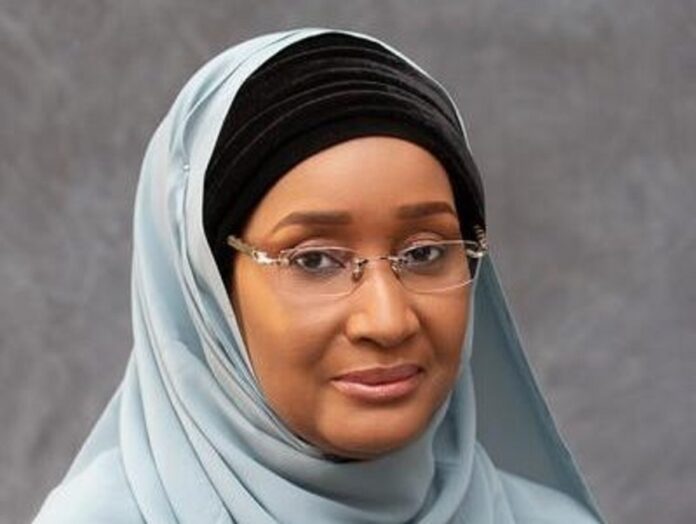From Ahmad SAKA, Bauchi
The Minister of Humanitarian Affairs, Disaster Management and Social Development, Hajiya Sadiya Umar Farouk haf flag up the disbursement of a grant of N20000 each to over 150,000 poor rural women across the 36 states of the federation and the Federal Capital Territory .
Sadiyya stated this at the flag-off of the grant for rural women project and symbolic disbursement held at Azare in Bauchi State on Thursday. She said the disbursement is expected to increase access to financial capital required for economic activities
She said The conditional cash transfer program in Bauchi State was intended to improve the socio-economic and livelihood of over 54,738 poor and vulnerable households enrolled across 16 local government areas of Gamawa, Tafawa-Balewa, Alkaleri, Darazau, Bogoro, Zaki, Warji, Ningi, Katagum, Kirfi, Jama’are, Dambam, Dass, Itas/Gadau, Misau and Toro With a total disbursement to date of N2,987,360,000.
The minister said that “it is our hope that the beneficiaries of this programme will make good use of the opportunity to increase their income, enhance their food security, and generally contribute towards improving their living standard.”
She explained that the grant for rural women programme was introduced in 2020 by the Ministry of Humanitarian Affairs, Disaster Management and Social Development as part of President Mohammadu Buhari’s social inclusion and poverty reduction agenda, including the realization of the national aspiration of lifting 100 million Nigerians out of poverty in 10 years.
Sadiyya said the programme is designed to provide a one-off grant to some of the poorest and most vulnerable women in rural Nigeria.
Represented by the Deputy Director, Humanitarian Affairs of the Ministry, Dr. Abubakar Suleiman, the minister explained that the Federal Government in partnership with the World Bank designed and developed a safety nets programme for Nigeria under the platform of the National Social Safety Net Project (NASSP).
She added that since the inception of President Muhammadu Buhari’s administration in 2015, the government has been paying more attention to protecting and promoting the plight of the poor and vulnerable in the country.
Minister said that: “This informed the decision to initiate the National Social Investment Programme (NSIP) as a strategy for enhancing social inclusion. NSIP is one of the largest social protection programmes in Africa. Since its introduction in 2016, it has impacted positively on the lives of the poor and vulnerable in Nigeria. I have personally witnessed the life-changing experiences of people who lived below the poverty line and those that are vulnerable to shocks.”
She said that the Conditional Cash Transfer Programme which commenced in September 2016 with the aim of responding to deficiencies in capacity and lack of investment in human capital of poor and vulnerable households.
The programme according to her is designed to deliver timely and accessible cash transfers to beneficiary households and sets to support development objectives and priorities, to achieve Improve household consumption, Increase in utilization of health and nutrition services, Improve school enrolment and attendance, Improve environmental sanitation and management, Encourage household financial and asset acquisition as well as Engage beneficiaries in sustainable livelihood.
The minister also said that the programme provides targeted monthly base cash transfer of N5,000 to poor and vulnerable households with the sole aim of graduating them out of poverty.
The minister concluded that: “We believe with the complementary effort of His Excellency, Bala Muhammed, the Executive Governor of Bauchi State, the target beneficiaries will be on their way out of poverty to prosperity. I am optimistic that with support and cooperation of Your Excellency and other stakeholders present here, we can lift 100 million out of poverty by 2030.”
Emir of Katagum, Farouk Umar Kabir II thanked the minister for choosing his emirate for the flag off of the program which he believes will augment income generation of the rural woman who he said really need to be assisted.
The Emir who was represented by the Makaman Katagum, Aliyu Husseini called on the beneficiaries to ensure that they use the grant to act start a business which they will be able to sustain for the good of their families.
Related







